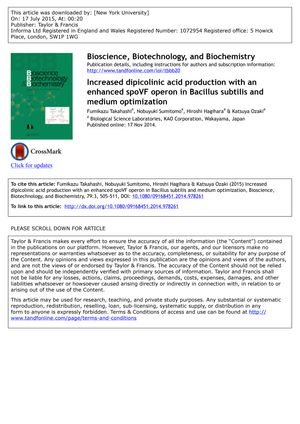Increased Dipicolinic Acid Production with an Enhanced spoVF Operon in Bacillus Subtilis and Medium Optimization
November 2014
in “
Bioscience, Biotechnology, and Biochemistry
”

TLDR Genetically modifying a bacteria and changing its growth conditions significantly increased the production of a chemical called dipicolinic acid.
In the 2015 study, researchers enhanced the production of dipicolinic acid (DPA) in Bacillus subtilis by genetically modifying the spoVF operon, which is responsible for DPA synthesis. They achieved this by replacing the native spoVFA promoter with a more active promoter from vegetative cells, allowing DPA production during the vegetative growth phase and its secretion into the culture medium. By optimizing the medium composition using a two-step Taguchi methodology, they significantly increased DPA productivity, reaching a concentration of 29.14 g/L after 72 hours of culture. This method offers a cost-effective way of producing DPA from renewable materials, with potential applications in various industries such as cosmetics and antimicrobials.